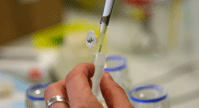Susceptibility to Pug Dog Encephalitis (PDE)
Description:

Pug Dog Encephalitis (PDE), or Necrotizing Meningoencephalitis (NME), is an aggressive and fatal inflammatory disease of the central nervous system.
The average age for signs to appear is 18 months, but some dogs are diagnosed as young as 6 weeks of age and others as old as 9 years. Affected dogs generally suffer from progressive neurological problems including circling, seizures, depression, ataxia, abnormal gait and blindness. Although not all of these signs are seen in every dog, most affected dogs become lethargic and depressed. When several of these signs occur together in a young adult Pug, particularly seizures, loss of coordination, and lethargy, PDE is suspected.
Pugs that are homozygous for PDE have a higher chance of developing symptoms of PDE. Those that are heterozygous for PDE are known as carriers. Carriers can pass on the PDE gene to offspring. When breeding with another carrier, there is a 25% chance that the offspring will be homozygous for PDE and develop symptoms.
Acceptable Sample Types:
Animal Genetics accepts buccal swab, blood, and dewclaw samples for testing. Complimentary sample collection kits are available and can be ordered at Canine Test Now.
This Test Is Relevant For the Following Breeds:
- Pug Dog
Results:
Animal Genetics offers DNA testing for susceptibility to Pug Dog Encephalitis (PDE). The genetic test verifies the presence of the recessive gene and presents results as one of the following:
| PDE/PDE | At risk | 2 copies of the susceptibility associated markers. Dogs with 2 copies are 12.75 times more likely to develop PDE in their lifetime. |
| PDE/n | Carrier | Both the normal and mutant copies of the gene detected. Dog is a carrier for the PDE mutations and can pass on a copy of the defective gene to its offspring 50% 0f the time. |
| n/n | Clear | Dog has 2 copies of the low risk PDE markers and will not pass on the defective high risk markers to its offspring. |
Submit a Sample for Testing:
To submit a sample for testing please go to Canine Test Now.
To order a sample collection kit please go to order sample collection kits.
Cost per sample is $45.00. Please see our Canine Fee Schedule for all test rates.










